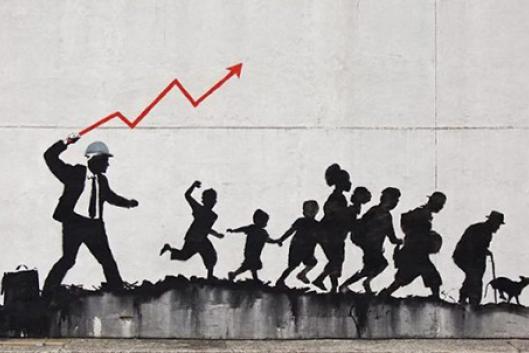This bulletin seeks to warn about the strategies used by those imposing themselves on territories with the development flag – now also alongside others like “sustainable” or “carbon neutral.” They increasingly work in alliance with financial capital—which they see as a partner, and which they reinforce with public resources.
This bulletin seeks to critically reflect on what has been badly named development, and to warn about the strategies that actors promoting it use to enter territories. It is well known that the development imposed by hundreds of agencies, organizations, banks and programs—now disguised with other words like “sustainable” or “carbon neutral”—is instrumental in enabling the voracious advance of plunder, and the consequent destruction of forests and livelihoods of millions of people. In recent years, these actors have also been increasingly working with financial capital, which they see as an ally in development, and which they reinforce with public resources.
We must not forget that the concept of development was announced after the Second World War, when former US president, Truman, took advantage of the European collapse and said that the United States should offer its advances and progress to aid in the growth of underdeveloped areas. Furthermore, he called on all governments to follow suit in the quest for development.
It was then that the world was divided into two: developed countries in the North, and underdeveloped (or developing) countries in the South. Given the historical process framing this division, these two “blocs” could well have been called: the colonizers (of development) and the colonies (to develop, or rather, to plunder).
In this development crusade, international and capitalist institutions—essentially led by the United States government and the G-8 bloc—imposed the development rules, primarily for the Global South. The World Bank (WB), International Monetary Fund (IMF), World Trade Organization (WTO), regional development banks and other evangelists were established as the absolute (almost imperial) actors of political and economic power, toting the development bible under their arm.
Thus, Structural Adjustment Programs dictated by the IMF and the World Bank forced countries in the South to impose harsh policies, in order to open up to the “free market” in the name of development, growth and progress. Later, governments established (and continue to establish) Public-Private Partnerships as a requirement to receive loans from these institutions—despite the fact that these Partnerships completely benefit private capital at the expense of the public sector. Banks and development agencies are often important stakeholders in these Partnerships.
Meanwhile, countries in the North established their own agencies for development cooperation—such as the United States Agency for International Development (USAID), the German Agency for International Cooperation (GIZ), the German Development Bank (KfW) and the Japan International Cooperation Agency (JICA), etc.—in order to implement and monitor their own foreign policies and interests in the South in a calculated way.
Thus, many industrial plantation companies in the North owe the survival of their activities in underdeveloped countries in large part to donations from their own governments. Without grants, cheap financing and other subsidies, these extremely expensive plantations and pulp mills would never be productive. Some of these subsidies are transferred through multilateral agencies before being diverted to the corporate sector. In other cases, funds collected through taxes paid by citizens in the North are channelled to the coffers of these private companies through agencies for development cooperation (1).
The concept of development, created from a white Western viewpoint, denies or denigrates the many diversities, existences and visions of being in the territories. Non-white and non-Western territories (which include a plurality of peoples, practices, forests, spaces and rhythms of life, rivers, histories and knowledge) are constantly subordinated, violated and stigmatized with the label of underdeveloped. This reflects the fact that capitalist societies are increasingly immersed in a vision of growth that is racist, classist and patriarchal. This vision proclaims to be universal, and in so doing, makes non-white territories invisible or silences them (almost always through force), essentially seeking to magnify the capitalist economy of oppression.
In reaction to strong resistance in the South and to international pressure about the environmental and climate emergency, development actors began to support the concept of green growth. In 2011, the UN launched a call for green growth, and in 2012, the World Bank released a report entitled Inclusive Green Growth—The Pathway to Sustainable Development.
This change in rhetoric (but not in substance) is extremely useful to capitalism. It has allowed the development industry to continue and to expand its practices, businesses and accumulation—and therefore also expand the plunder, violence and dispossession.
Additionally, development banks and funds have grown massively in the last two decades and have become increasingly intertwined with global finance. The portfolio of European development finance institutions has quadrupled, from 10.9 billion euros in 2005 to 41.2 billion euros in 2018. These institutions increasingly act like any other investor, and they see the private financial sector as a development actor, reinforcing it with public resources. Thus, we increasingly see these actors participating in agribusiness and land-grabbing (2).
More recently, some of these banks and funds have created their own asset management companies. These are called development funds, or more accurately, investment and capital funds. To manage these funds, the World Bank created its own company, the Asset Management Company, which today manages US $10 billion in 13 funds (3).
Over 70 years after Truman divided the world, the concept of development continues to be used for plunder. Its evangelists are the key drivers of privatization policies, which pave the way for corporations and financial actors to enter and destroy more and more territories and forests.
We hope this bulletin offers a reflection to support the construction and strengthening of alliances among movements and grassroots groups, and to reject this colonizing, racist and patriarchal development.
(1) Ricardo Carrere y Larry Lohmann, 1996, Pulping the South
(2) Focus on the Global South, TNI, Fian International, 2020, Rogue Capitalism and the financialization of territories and nature
(3) Idem (2)
